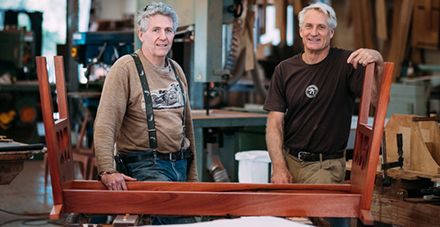For 34 years Gary Bennett’s native timber furniture studio, JahRoc, has sat like beacon to travellers that you have now entered Margaret River – a home of environmentally sustainable craft and unique timber. Source: WA Today
JahRoc, which Mr Bennett co-owns with David Paris, sits on the main street of Western Australia’s famed surfing and wine hamlet and has been sourcing recycled native local timbers from fallen logs or old buildings since 1987.
There’s a reason the pair call it a gallery as they have lovingly crafted these niche finds into works of art, at equally eye-watering prices.
“We love timber; humans are drawn to it like it’s a part of us,” Mr Bennett said.
“I’d much rather a timber table than a plastic one because it’s something beautiful and warm.”
And over 34 years they have seen the changes to the region’s native forest management and the complex and heated arguments between conservation groups protesting logging, the sawmills (many of whom are greenies at heart, according to Bennett), the agents for forest industry, and the Forest Products Commission tasked to manage the forest in line with industry and fire management, while bound by the state government of the day.
“It’s a pretty complex business, and it’s been going on a long time,” Mr Bennett said.
“I remember when the whole industry changed under [former premier] Geoff Gallop, when he brought in the ban to old-growth logging and installed the FPC to manage the resource.
“I think they did a pretty good job for a long time, and it’s one of the only reasons that we’ve got any forest left.”
At the time there had been broadacre clearing to make way for farmland and no one in the community wanted to watch any more “big beautiful trees” being felled, according to Bennett.
“It’s a shame that the timber industry is slowly getting killed.”
But over time, as the areas of logging shrank with regeneration of younger plantings coming under increasing pressure to meet demand, the logging sizes grew smaller and less usable for furniture and flooring.
For Mr Bennett, it was heartbreaking to watch as karri, jarrah and wandoo ended up as firewood or woodchips to be exported for paper or other reconstituted products to then be sold back to Australia.
And while the state government’s Wednesday announcement to stop all logging of the South West native forest by 2024, with all two-tier karri forest immediately protected, won’t impact JahRoc’s supply, Mr Bennett can see that the price of jarrah and other native wood will go up and will push people into buying overseas timber that will come from unprotected rainforests.
Ian Telfer, president of the Forest Industries Federation WA and woodfibre exporter, says it is a short-sighted political play by government that isn’t good for the environment or the economy.
“I’ll use Bunnings as the example: they will go and get Indonesian rainforest timber to replace jarrah because consumers who want timber will still go to the store and still buy products,” he said.
“We want to build in the most sustainable way and better that it’s from well-managed forests to support that timber demand, and produce flooring and decking and furniture, produced locally.”
The South West forest is the only place in the world that jarrah and karri can be sourced and jarrah can’t be grown on plantations because it requires the biodiversity of native forests to grow.
Mr Telfer has been lobbying the government for the past two years about how better to utilise timber and was only weeks ago discussing the injection of $100 million into the technology and innovation required for the industry to transition towards more effective use of smaller diameter timber coming from regrowth forest.
He is fuming over the sudden decision to stop all logging, saying it’s a myth to suggest that regrowth logging can’t sit side-by-side with conservation and carbon capture within the forest, as well as managing fire fuel loads, as they have done over the years.
He says the new announcement will not stop tree felling for “thinning” purposes and land clearing for urban development, roads and mining.
“Fundamentally, if you’re going to cut down a tree, I think everybody in the community supports ‘well it’d be better to use that timber rather than it going to waste’. And if you can produce products out of it all the better.”
For Mr Bennett, the announcement won’t affect his business which has been booming under COVID conditions with orders well into this time next year.
Yet he too sees that his is a threatened local trade since the state government ceased all local carpentry training and poured most apprenticeship money into building and construction, with his last apprentice having to travel to Queensland to study.
“With less and less material, furniture-making becomes less viable,” he reflected.
“It’s a shame that the timber industry is slowly getting killed.”






